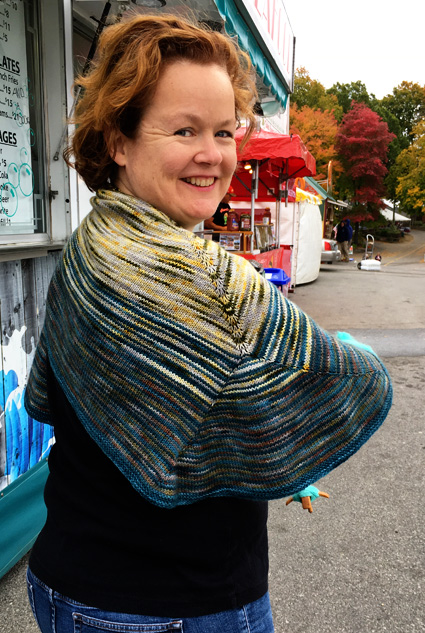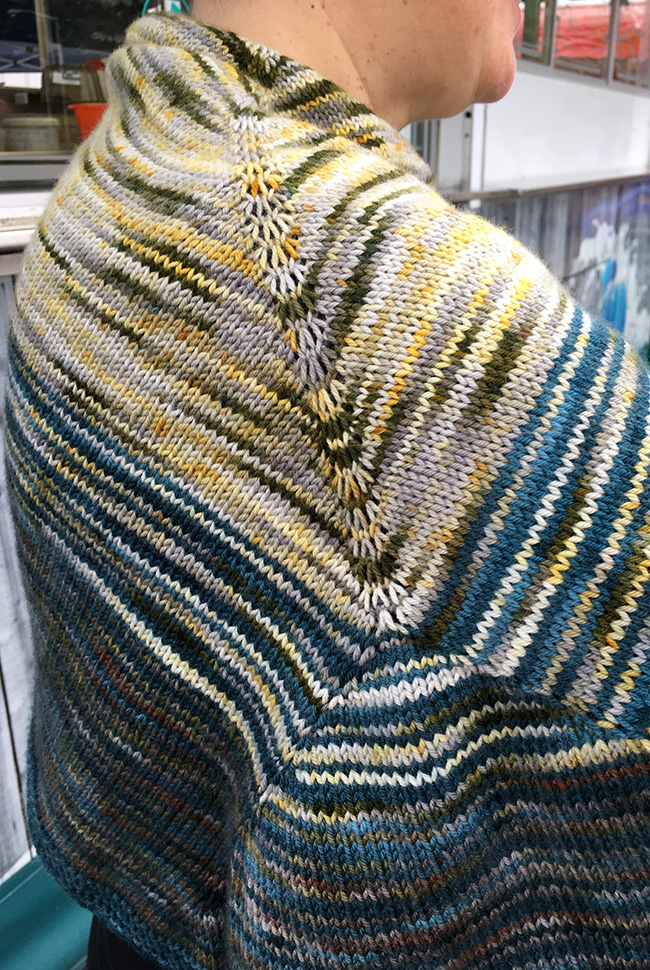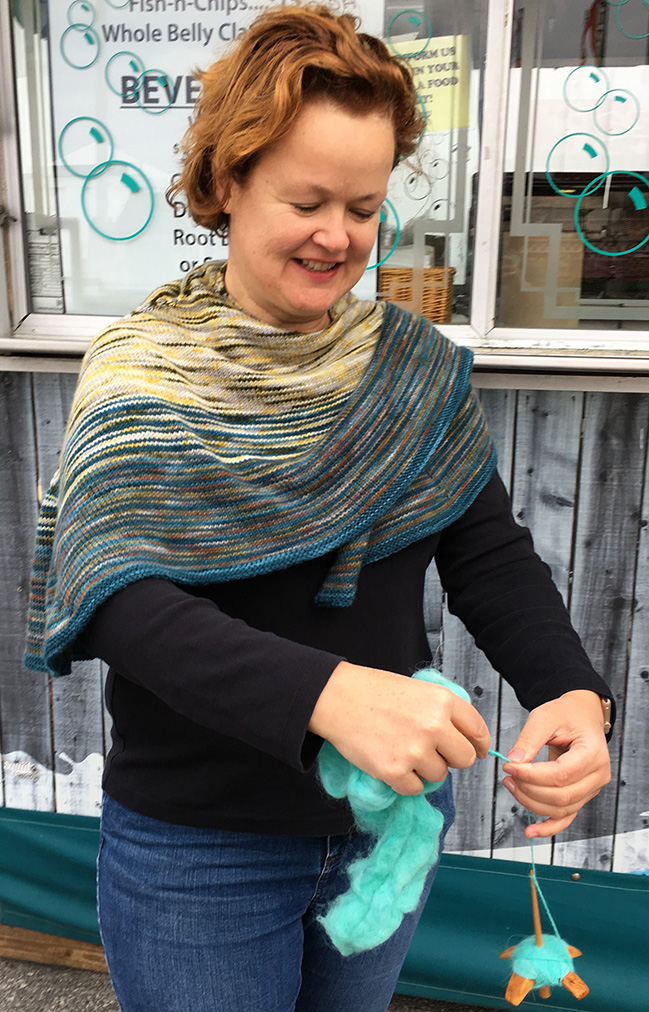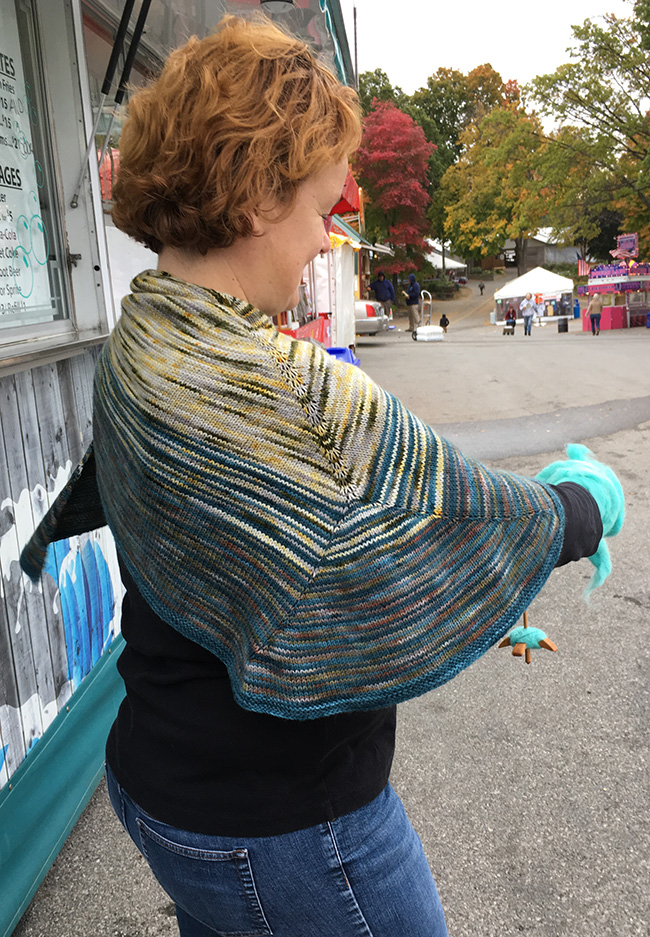Tuplet shawl, a free knitting pattern from Knitty.com. Free knitting pattern for a three-panel shawl with unusual construction.
INTRODUCTION
Tuplet

![]()
A unique and easy striped crescent shawl using three different shades.
In the world of music a “tuplet” is an irrational rhythm. If the music is a straight 4/4 beat, the tuplet both fits in and stands out adding notes where you don’t expect them – making square music swing.
This shawl brings the tuplet to knitting. Instead of knitting back and forth like a straight 4/4 beat, this shawl mixes up the row directions, making attractive colorwork stripes with no ends to weave in as you go.
The sample shawl is done in a lovely gradient using three different subtly variegated skeins, but the Tuplet shawl could also be done with solid contrasting colors in any order. Or two solids and a loud busy hand-dyed. You decide.
 model: Heather Classen
model: Heather Classen
 photos: Amy Singer
photos: Amy Singer
SIZE
OneFINISHED MEASUREMENTS
Width: 64 inches/162 cm
Length: 21 inches/54 cm
MATERIALS
Yarn
Blue Moon Fiber Arts “Cloud Nine” [80% superwash merino, 10% cashmere, 10% nylon; 405 yd/370 m per 4.25 oz/120 g skein];
![]() [C1] Tree Toots; 1 skein – sample used 330 yds
[C1] Tree Toots; 1 skein – sample used 330 yds
![]() [C2] Antiquated System; 1 skein – sample used 237 yds
[C2] Antiquated System; 1 skein – sample used 237 yds
![]() [C3] Spinel; 1 skein – sample used 369 yrs
[C3] Spinel; 1 skein – sample used 369 yrs
Recommended needle size
[always use a needle size that gives you the gauge listed below - every knitter's gauge is unique]
![]() 40-inch US #7/ 4.5mm circular needle
40-inch US #7/ 4.5mm circular needle
Notions
![]() 4 stitch markers
4 stitch markers
![]() yarn needle
yarn needle
GAUGE
23 sts/32 rows = 4 inches/10 cm in stockinette stitch after blocking
PATTERN NOTES
[Knitty's list of standard abbreviations and techniques can be found here.]
Colors are referred to as Color 1, Color 2, Color 3. Colors 1 and 3 are alternated first, ending with Colors 2 and 3 alternating.
Increases are worked on RS rows.
To knit stripes in the same direction knit across with the first color, leave that first color on the left without turning the work, slide the piece back across the needles to the right side and work the second color across. This creates stripes one row high. This pattern alternates knitting back and forth with knitting two rows in the same direction creating eye-catching stripes.
The increases are on the ends and the middle, leaving a squarely knit portion on each side 147 stitches wide
The first section is done with Color 1, the second section alternates colors 1 and 3, the third section alternates colors 3 and 2, finishing with solid color 3 as the edging.
There is no need to cut the other alternate yarn color as you work the stripes; instead carry the contrasting color up on the edge stitches so it’s available when called for and there won’t be unnecessary ends to weave in.
DIRECTIONS

Garter Tab:
Using Color 1, CO 2 sts.
Knit 5 rows.
Row 6 [WS]: K2, turn work 90 degrees and pick up and knit 3 sts along long edge, turn work again and pick up and knit 2 more sts in CO edge. 7 sts.
Start of Crescent:
Row 1 [RS]: K3, pm, k1, pm, k3.
Row 2 [WS]: K2, purl to last 2 stitches, k2.
Row 3 [RS]: K2, m1r, k1, m1l, sm, k1, sm, m1r, k1, m1l, k2. (11 stitches)
Row 4 [WS]: Repeat Row 2.
Row 5 [RS]: K1, (k1, m1r, k1, m1l) twice, sm, k1, sm, (m1r, k1, m1l, k1) twice, k1. 19 stitches.
Row 6 [WS]: Repeat Row 2.
Row 7 [RS]: K2, m1r, k1, m1l, knit to 1 st before marker, m1r, k1, m1l, sm, k1, sm, m1r, k1, m1l, knit to 3 st before end, m1r, k1, m1l, k2. 8 sts increased.
Row 8 [WS]: Repeat Row 2.
Repeat Rows 7-8 33 more times. 291 sts.
Row 75 [RS]: K2, pm, m1r, k1, m1l, knit to 1 st before marker, m1r, k1, m1l, sm, k1, sm, m1r, k1, m1l, knit to 3 st before end, m1r, k1, m1l, pm, k2. 299 sts.
Row 76 [WS]: Repeat Row 2.

Part 2
You should have 2 edge sts in garter stitch, followed by 147 stockinette sts, and then the center stitch surrounded by two markers, 147 more stockinette sts, and 2 edge garter sts.
Part 2A:
Use Color 3 for Dark, Color 1 for Light.
Row 1 [RS]: With Dark, k2, m1l, k to marker, sm, k to next marker, sm, m1r, k to marker, m1l, sm, k to next marker, sm, knit to last 2 sts, m1r, k2. 4 sts increased. Do not turn; slide sts back to start of the row.
Row 2 [RS]: With Light, p2, m1l, k to marker, sm, k to next marker, sm, m1r, k to marker, m1l, sm, k to next marker, sm, knit to last 2 sts, m1r, sm, p2. 4 sts increased. Turn work.
Row 3 [WS]: With Dark, purl. Turn work.
Row 4 [RS]: With Dark, p2, m1l, knit to marker, m1r, sm, k to next marker, sm, m1r, k1, m1l, knit to 1 before marker, m1r, k1, m1l, sm, knit to marker, sm, m1l, knit to last 2 sts, m1r, p2. 8 sts increased. Turn work.
Row 5 [WS]: With Light, purl. Do not turn; slide sts back to start of the row.
Row 6 [WS]: With Dark, k2, purl to last two sts, k2. Turn work.
Row 7 [RS]: With Light, k2, m1l, knit to marker, m1r, sm, k to next marker, sm, m1r, k1, m1l, knit to 1 before marker, m1r, k1, m1l, sm, knit to marker, sm, m1l, knit to last 2 sts, m1r, k2. 8 sts increased. Turn work.
Row 8 [WS]: With Light, k2, purl to last 2 sts, k2. Turn work.
Row 9 [RS]: With Dark, k2, m1l, knit to marker, m1r, sm, k to next marker, sm, m1r, k1, m1l, knit to 1 before marker, m1r, k1, m1l, sm, knit to marker, sm, m1l, knit to last 2 sts, m1r, k2. 8 sts increased. Turn work.
Row 10 [WS]: With Dark, k2, purl to last two sts, k2. Turn work.
Row 11 [RS]: With Light, k2, m1l, k to marker, sm, k to next marker, sm, m1r, k to marker, m1l, sm, k to next marker, sm, knit to last 2 sts, m1r, k2. 4 sts increased. Do not turn; slide sts back to start of the row.
Row 12 [RS]: With Dark, p2, m1l, k to marker, sm, k to next marker, sm, m1r, k to marker, m1l, sm, k to next marker, sm, knit to last 2 sts, m1r, sm, p2. 4 sts increased. Turn work.
Row 13 [WS]: With Light, purl. Turn work.
Row 14 [RS]: With Light, p2, m1l, knit to marker, m1r, sm, k to next marker, sm, m1r, k1, m1l, knit to 1 before marker, m1r, k1, m1l, sm, knit to marker, sm, m1l, knit to last 2 sts, m1r, p2. 8 sts increased. Turn work.
Row 15 [WS]: With Dark, purl. Do not turn; slide sts back to start of the row.
Row 16 [WS]: With Light, k2, purl to last two sts, k2. Turn work.
Row 17 [RS]: With Dark, k2, m1l, knit to marker, m1r, sm, k to next marker, sm, m1r, k1, m1l, knit to 1 before marker, m1r, k1, m1l, sm, knit to marker, sm, m1l, knit to last 2 sts, m1r, k2. 8 sts increased. Turn work.
Row 18 [WS]: With Dark, k2, purl to last two sts, k2. Turn work.
Row 19 [RS]: With Light, k2, m1l, knit to marker, m1r, sm, k to next marker, sm, m1r, k1, m1l, knit to 1 before marker, m1r, k1, m1l, sm, knit to marker, sm, m1l, knit to last 2 sts, m1r, k2. 8 sts increased. Turn work.
Row 20 [WS]: With Light, k2, purl to last two sts, k2. Turn work.
Cut Color 1.
Part 2B:
Use Color 2 for Light; Color 3 remains as Dark.
Work Rows 1-20 twice.
Cut Color 2
Final pattern row [RS]: K2, m1l, k to marker, sm, k to next marker, sm, m1r, k to marker, m1l, sm, k to next marker, sm, knit to last 2 sts, m1r, k2. 4 sts increased.
Lower Edge:
Edging row: K2, m1l, k to 2 sts before end, m1r, k2. 2 sts increased.
Repeat Edging row 6 more times.
BO as follows: *K1, yo, k1, pass previous 2 sts over most recent st; repeat from * until all sts have been bound off.

FINISHING
Wet block, shaping crescent. Weave in ends.
ABOUT THE DESIGNER
 A computer chip, fabric, and knitwear designer, she loves science & tech, good stories, art, nice colors, and any diorama anywhere.
A computer chip, fabric, and knitwear designer, she loves science & tech, good stories, art, nice colors, and any diorama anywhere.
Heather lives in Boston where she volunteers giving fellow nerds social lives at her Nerd Fun Boston Meetup, connecting people to science, history, and each other. She also plays violin in the Cambridge Symphony Orchestra. Both nerddom and music inspire her knitting patterns. Find her here and here.
Pattern & images © 2016 Heather Classen. Contact Heather








